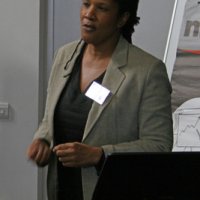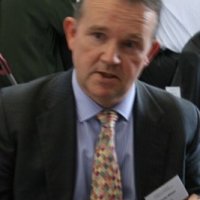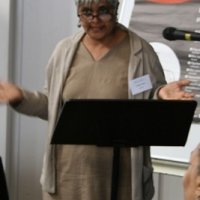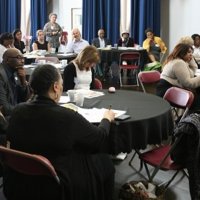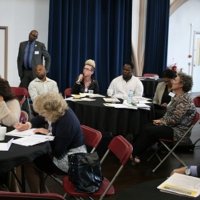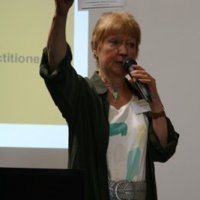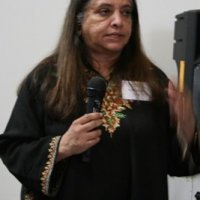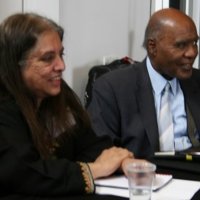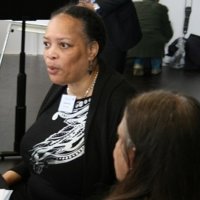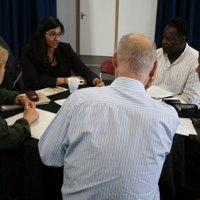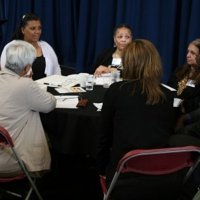IEDP, 03 Jun 2014
The fourth and final free seminar of our series of four took place in Bristol on 3rd June at The Trinity Centre. Unfortunately, one of our keynotes speakers, Lord Herman Ouseley, was unable to attend due to ill health, and IEDP Chair Linda Bellos was also unable to come for family reasons. We were sorry not to have the benefit of their input, but in spite of this the 25 people who attended took part a lively and very interesting day which was chaired by IEDP board member Drew Wilkins.
As usual everyone was welcomed to the event by Mary-Ann Nossent, IEDP lead on events, who gave an overview of the IEDP and the series of seminars. This introduction was followed by the first panel of three speakers, Marlene Ellis, Pragna Patel and Malcolm Wilson.
We were very grateful to former IEDP board member Marlene Ellis for kindly stepping in at short notice to replace Herman Ouseley. Marlene told us about her experiences as a Metropolitan Police Officer based in Central London where she became the first black woman sergeant. She also served on the Serious Organised Crime Squad before retiring after 12 years. She explained her reasons for joining the police, and then focused on some key moments during that period such as the end of the Women’s Police Service and the start of the Black Police Association.
The second speaker was Pragna Patel, Director of Southall Black Sisters (SBS). Pragna talked about the context of SBS’s work since the 1979. She spoke about the need to put race back into equality, as she feels it had fallen off the agenda. She spoke of many challenges in the area of race equality, for example prison numbers, death in custody and employment. She argued that recently there have been disproportionate cuts to equality organisations, while faith-based organisations have been getting funding, and that using religion as a proxy for race equality is operating against human rights, particularly for women.
The final speaker of the morning panel was Malcolm Wilson, currently the Nottingham Virtual School Headteacher for Looked After Children, and previously Senior Adviser for the Education Service for Travellers in the West Midlands. Malcolm share some of his own experiences at school and as a teacher of Irish Traveller heritage. His presentation looked at the different Gypsy Roma Traveller (GRT) communities and highlighted the racism these groups face on a daily basis. He also talked about what needs to be done to counter racism towards the GRT communities in schools.
After a lively question and answer session, there were brief presentations from Kate Hinton on IEDP accreditation and Sheekha Rajani on DiversityJobs’ ‘The Big IDEA’website before lunch.
The afternoon session opened with two keynote speakers, Paul Stephenson and Ila Chandavarkar. Paul Stephenson related his experiences of 50 years ago when he organised the Bristol bus boycott. This was because the Bristol Bus Company, with the collaboration of the City Council and the trade unions, was refusing to employ Black people. He talked about the overt racism in Britain fifty years, what was going on globally at that time and how his campaign was inspired by Martin Luther King and Nelson Mandela. He said that although it is less open prejudice and discrimination are still with us, arguing that racism is fed by fear and despair, and we need love and respect to tackle it.
The final speaker of the day, Ila Chanavarkar, described a practical piece of work carried out collaboratively between the Women’s Resource Centre (WRC) and Oxfam. This was called ‘Routes to Solidarity’ and aimed to increase the voice and influence of Black and Minority Ethnic (BME) women. Ila shared some interesting statistics showing how poverty has more impact on women than on men. The WRC had also published an interesting report which compared Equality Schemes in different local authorities and found extremely variable practice. She commented that the abolition of the Audit Commission had meant it was very difficult to compare practice in different authorities.
After a short question and answer session we moved into roundtable discussions, which focused on good practice, concerns and ways forward for the IEDP and other organisations. This was followed by a plenary session taking brief feedback from the groups. Click here for a summary of points raised in the roundtable discussions. Speakers’ PowerPoints are available on the members' area of this website, so you will need a password to access them.


